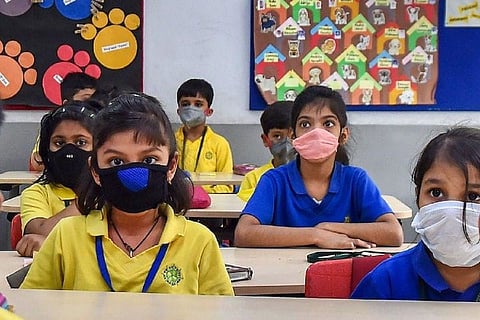

Schools are scheduled to reopen in Andhra Pradesh on August 3, and students are expected to return to a very different school experience than they were used to until March, before the pandemic arrived and the lockdown began. Schools in Andhra are now likely to run in shifts — to bring down student strength — and some students may even have classes on alternate days depending on the size of the school. Morning assemblies on the school grounds are likely to become a thing of the past, along with team sports in the PE period.
While public transport, offices, shops, and various businesses and industries are resuming operations with protocols in place to avoid infection, imposing physical distancing and other precautionary measures in classrooms, playgrounds and school buses filled with children can be extremely difficult for parents, teachers and school staff.
The Commissioner of School Education (CSE), V China Veerabhadrudu, has drafted a Standard Operating Procedure (SOP) for reopening schools at a time when the state is dealing with COVID-19.
As per the SOP, various surfaces within the school premises, with a high possibility of contact, are to be disinfected, including the gate, door handles, electrical switches, windows, the bathrooms, toilets, sinks or wash-basins, drinking water taps, playground equipment, walls, benches etc., daily after school hours.
Classrooms and COVID-19
A fever check shall be done at the entry to the school, and automatic handwash stations are to be set up so students can wash their hands before entering the school. Masks will be provided to students and teachers, and the use of masks and gloves will be made compulsory for teachers and the mid-day meal staff. For students, carrying a handkerchief will be made a compulsory and a part of their school uniform.
Students, teachers and parents showing any COVID-19 symptoms will be asked to stay at home.
According to the draft SOP, small schools with less than 30 students will have a single shift from 8 am to 12 pm, with 15 students in each classroom. Schools with more than 30 students will have to work in two shifts, from 8 am to 12 pm, and 12 30 pm to 4 30 pm, to bring down the number of students in a classroom.
In schools with 50 to 100 students, students may have classes on alternate days, with four batches of students and two shifts per day. Workbooks are to be given to students to continue learning at home.
Health and nutrition
Lunch and water bells will also be staggered so that students can queue up in groups of ten. Students will be made to wash their hands many times a day, including before and after water breaks and lunch breaks, and before entering and while leaving school. Information about COVID-19 and safety measures are to be reiterated to students every day.
Students may have to give up all contact sports and switch to yoga and other individual exercises.
Students are to be given vitamin A, iron and folic acid tablets. Health checkups are to be held on alternate Saturdays, and health records for every student will have to be maintained by the school. Hot, freshly cooked mid-day meals might be replaced with dry ration for a while, to be distributed by the mid-day meal staff while wearing gloves and masks.
Protocol for board exams
The class 10 SSC (Secondary School Certificate) exams will be conducted from July 10 to 15, and the number of exam centres is being increased to have fewer students in each classroom. Temperature check is to be done at the entrance to the exam centre, along with hand wash. Masks will be compulsory for all, and the invigilators distributing the question and answer sheets will have to wear gloves.
District Collectors may have to arrange transportation for students living in containment zones to reach the exam centre. No exam centres will be in containment zones. Students showing symptoms of COVID-19 will be made to write the exam in separate ‘isolation rooms.’
The initial version will be revised, taking into account the various measures being adopted across the world.
The pandemic and the lockdown has had a severe impact on children’s mental health, causing stress and anxiety, also caused by the lack of interaction with peers, Veerabhadrudu wrote.
Schools and colleges had been closed across the state from March 19, a couple of days before the state borders were closed, and before the nationwide lockdown came into place on March 25. Exams for classes 1 to 5 had already been conducted, and students from classes 6 to 9 were promoted without any exams. While schools were earlier scheduled to open in June, this had now been postponed to August 3.